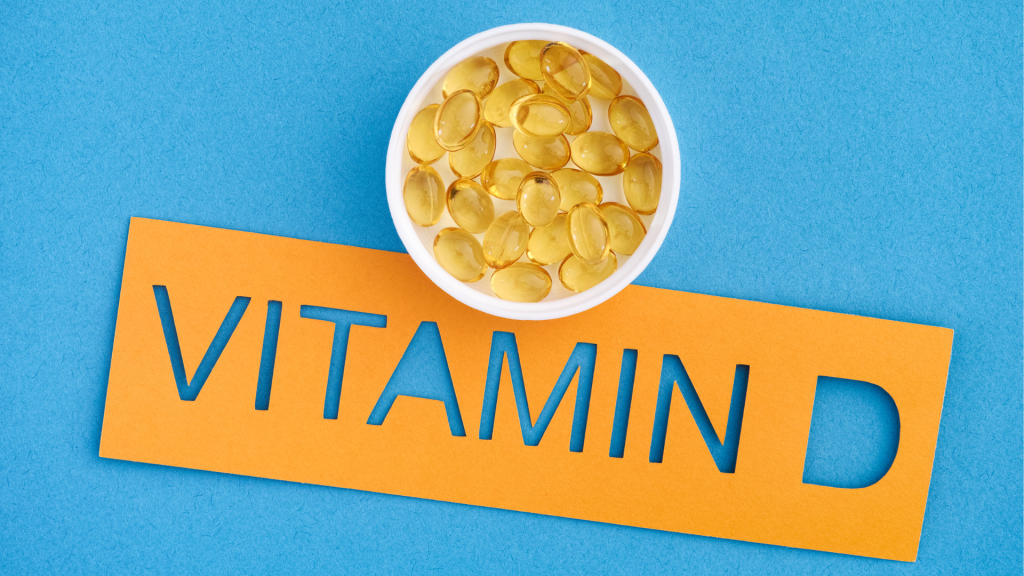What is Vitamin D Deficiency?
Vitamin D deficiency means your body doesn’t have enough vitamin D. It mainly affects your bones and muscles. Vitamin D is essential for healthy bone growth and maintenance. It also supports your nervous, immune, and musculoskeletal systems.
You can get vitamin D in several ways:
- Sunlight exposure on your skin.
(Note: Older adults, people with darker skin, or those in certain locations may not get enough this way.) - Through the food you eat.
- By taking nutritional supplements.
Even with these sources, vitamin D deficiency is still a common problem around the world.
Why is it so important?
Vitamin D is an essential nutrient that helps your body stay healthy by maintaining calcium and phosphorus balance in the blood and supporting strong bones and tissues. It enables your body to absorb calcium and phosphorus effectively, both of which are critical for building and maintaining bone health.
When vitamin D deficiency becomes chronic or severe, the intestines absorb less calcium and phosphorus. This leads to hypocalcemia (low blood calcium levels), which triggers secondary hyperparathyroidism—a condition where the parathyroid glands become overactive to maintain normal calcium levels.
Severe hypocalcemia and hyperparathyroidism can cause symptoms like muscle weakness, cramps, fatigue, and depression. To stabilize calcium levels, the body draws calcium from bones, leading to bone demineralization—a process where bones break down faster than they can rebuild.
This can result in osteomalacia (softening of bones) in adults and rickets in children. Both conditions increase the risk of bone fractures. In children, whose bones are still developing, rickets can cause bowed or misshapen bones due to weakened bone structure.
Symptoms and Causes
Signs and symptoms
A severe deficiency of vitamin D in children can lead to rickets, a condition that affects bone development. Common symptoms of rickets include:
- Abnormal growth due to bowed or bent bones
- Muscle weakness
- Bone pain
- Joint deformities
Rickets is rare, but children with a mild vitamin D deficiency may still experience muscle weakness, soreness, or pain.
In adults, vitamin D deficiency can be harder to detect. Possible signs and symptoms include:
- Fatigue
- Bone pain
- Muscle weakness, aches, or cramps
- Mood changes, such as depression
However, many people with vitamin D deficiency may show no noticeable symptoms at all.

What causes vitamin D deficiency?
In general, the two main causes of vitamin D deficiency are:
- Not getting enough vitamin D in your diet and/or through sunlight.
- Your body isn’t properly absorbing or using vitamin D.
There are several specific causes of vitamin D deficiency, including:
- Certain medical conditions.
- Weight-loss surgeries.
- Certain medications.
Several different biological and environmental factors can also put you at a greater risk of developing vitamin D deficiency, such as older age and the amount of melanin (pigment) in your skin.
Medical conditions that may lead to vitamin D deficiency
Medical conditions that can cause vitamin D deficiency include:
- Cystic fibrosis, Crohn’s disease, and celiac disease: These digestive disorders can significantly impair your intestines’ ability to absorb vitamin D properly—especially from supplements. When left untreated, these conditions further reduce absorption efficiency, leading to deficiency.
- Obesity: In individuals with a body mass index (BMI) over 30, vitamin D levels are often lower. This is because fat cells tend to trap and isolate vitamin D, preventing it from being released into circulation. As a result, people with obesity may require higher doses of vitamin D supplements to achieve and maintain adequate levels.
- Kidney and liver disease: These organs play crucial roles in converting vitamin D into its active form. Specifically, liver disease can reduce the production of the enzyme 25-hydroxylase, while kidney disease can limit 1-alpha-hydroxylase production. Without these enzymes, your body can’t convert vitamin D into a usable form, ultimately leading to deficiency.
Medications that can cause vitamin D deficiency
Certain medications can contribute to lower vitamin D levels, including:
- Laxatives – When used frequently, they can interfere with nutrient absorption, including vitamin D.
- Steroids (e.g., prednisone) – These can reduce calcium absorption and impair vitamin D metabolism.
- Cholesterol-lowering drugs – Medications such as cholestyramine and colestipol may block the absorption of vitamin D in the intestines.
- Anti-seizure medications – Drugs like phenobarbital and phenytoin can increase the breakdown of vitamin D in the liver, reducing its levels.
- Rifampin – Commonly used to treat tuberculosis, this drug may accelerate the breakdown of vitamin D.
- Orlistat – A weight-loss medication that limits fat absorption, which can also affect the absorption of fat-soluble vitamins like vitamin D.
Therefore, it’s important to inform your healthcare provider about all the medications, supplements, and herbal remedies you are taking. This ensures proper management of your vitamin D levels and overall health.
Diagnosis and Tests
Vitamin D deficiency is diagnosed through a blood test that measures the level of 25-hydroxyvitamin D in your blood. Levels below 20 ng/mL usually indicate a deficiency. Your doctor may also assess your medical history, symptoms, and any risk factors before recommending supplements or further testing.

How is vitamin D deficiency treated?
1. Vitamin D Supplements:
The most common treatment is taking vitamin D supplements. These are available in two main forms—D2 (ergocalciferol) and D3 (cholecalciferol). D3 is usually more effective at raising vitamin D levels. Your doctor will recommend the right dosage based on the severity of your deficiency.
2. Increased Sun Exposure:
Spending 10–30 minutes in sunlight, especially between 10 a.m. and 3 p.m., a few times a week can help your skin naturally produce vitamin D. However, factors like skin tone, geographic location, and use of sunscreen can affect how much vitamin D you produce.
3. Dietary Changes:
Incorporate vitamin D-rich foods into your diet, such as:
- Fatty fish (salmon, tuna, mackerel)
- Egg yolks
- Fortified milk, orange juice, and cereals
- Cheese
- Mushrooms exposed to sunlight
4. Treating Underlying Health Conditions:
If your deficiency is due to a medical issue (like Crohn’s disease, celiac disease, or kidney problems), addressing that condition is essential for long-term improvement.
5. Regular Monitoring:
Follow-up blood tests may be needed to ensure your vitamin D levels are returning to a healthy range. Your doctor may adjust your supplement dosage based on these results.
Prevention
Who Is Most at Risk for Vitamin D Deficiency?
People at higher risk include:
- Older adults (65+) – Reduced ability to make vitamin D.
- Infants – Especially breastfed babies, as breast milk has low vitamin D.
- People with dark skin – Darker skin produces less vitamin D from sunlight.
- Homebound individuals – Limited sun exposure increases risk.
How to Prevent Vitamin D Deficiency
- Get sunlight (10–30 mins a few times a week), but don’t overdo it without sunscreen.
- Eat vitamin D-rich foods like fatty fish, egg yolks, mushrooms, and beef liver.
- Include fortified foods such as milk (cow, soy, almond), cereal, and orange juice.
- Consider supplements if you’re at risk—consult a doctor first.
Recommended Daily Vitamin D Intake
| Age Group | Amount |
|---|---|
| Infants (0–12 months) | 10 mcg (400 IU) |
| Children & Adults (1–70 years) | 15 mcg (600 IU) |
| Adults (71+ years) | 20 mcg (800 IU) |
| Pregnant/Breastfeeding women | 15 mcg (600 IU) |




